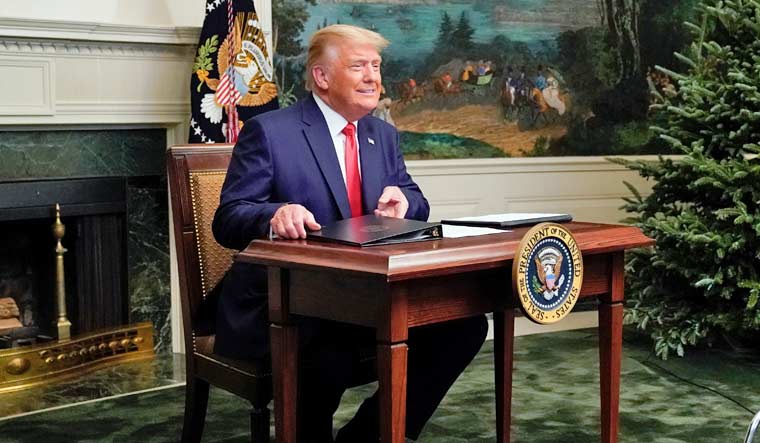The Republican Party still belongs to Donald Trump.
After he incited a deadly riot at the US Capitol last month, the GOP considered purging the norm-shattering former president. But in the end, only seven of 50 Senate Republicans voted to convict Trump in his historic second impeachment trial on Saturday.
For Trump's loyalists, the acquittal offers a vindication of sorts and a fresh connection to the former president's fiery base. And for Trump's GOP antagonists, it marks another alarming sign that the party is lurching further in a dangerous direction with little desire to reconnect with the moderates, women and college-educated voters Trump alienated.
Ultimately, the resolution of the impeachment trial brings into clear relief a divide in the GOP that party leaders, donors and voters will have to navigate as they try to regain control of Congress next year and aim to retake the White House in 2024.
That tension was on display in the immediate aftermath of the vote. After supporting Trump's acquittal, Senate Minority Leader Mitch McConnell, R-Ky., delivered a speech that echoed some of the very points Democratic impeachment managers emphasised in seeking Trump's conviction.
The history books will show that 10 members of the president's party in the House and another seven in the Senate ultimately believed that Trump's behaviour was egregious enough to warrant conviction and even a lifetime ban on holding future office. Never before have so many members of a president's party voted for his removal.
But by most objective measures, Trump's grasp on the GOP and its future remains airtight.
Gallup reported last month that Trump's approval among self-described Republicans stood at 82 per cent. And more recently, Monmouth University found that 72 per cent of Republicans continue to believe Trump's false claims that President Joe Biden won the November election only because of widespread voter fraud.
Lest their be any doubt about Trump's strength, House Republicans voted overwhelmingly last week to defend a diehard Trump loyalist, Rep. Marjorie Taylor Greene, R-Ga., even after evidence surfaced that she had repeatedly embraced violence, bigotry and conspiracy theories on social media.
Just days after House Minority Leader Kevin McCarthy called Trump responsible for the violent attack, McCarthy reversed himself and made a personal visit to Trump's Florida estate to ensure there was no lingering animosity.
Of the seven Republicans who voted to convict Trump on Saturday, only one faces reelection in the next four years. Indeed, in Trump's Republican Party, there are very few willing to cross him if they harbor future political ambitions.
One of them, 2024 prospect Nikki Haley, who was US ambassador to the United Nations under Trump, drew attention this week after telling Politico that Trump's role in the January 6 attack essentially disqualified him from running for office again.
He's fallen so far, Haley said. He went down a path he shouldn't have, and we shouldn't have followed him, and we shouldn't have listened to him. And we can't let that ever happen again.
Another Republican presidential prospect, Sen. Ben Sasse, R-Neb., voted to convict Trump on Saturday, declaring that Trump's lies about widespread voter fraud "endangered the life of the vice president" and are "bringing us dangerously close to a bloody constitutional crisis".
While Sasse may run for president in 2024, he won't face Republican primary voters in Nebraska again unless he chooses to run for reelection in 2026.
Similarly, GOP Sen. Bill Cassidy of Louisiana faced a censure by his state party after voting to convict Trump. But he won't face voters again until 2026 so is relatively insulated from political consequences.
Despite McConnell's criticism, Trump's most vocal Republican opponents at this point will likely consist of a collection of retired Republicans on cable news and a Never Trump movement grappling with its own existential challenges.
The Lincoln Project, perhaps the most prominent and best-funded anti-Trump Republican group, is coming off a tumultuous week following revelations that its leaders knew about multiple allegations of sexual misconduct against a co-founder several months before acknowledging them publicly.
The self-described senior leader of the organisation, veteran Republican strategist Steve Schmidt, stepped down from the board on the eve of the Senate impeachment vote, a day after the Lincoln Project announced plans to bring in an outside investigator.
The fallout threatens to undermine the organisation's fundraising appeal and its influence, even as the super PAC works to expand its reach through a popular podcast and expanding streaming video channel that drew more than 4 million views last month alone.
Even before the crisis, co-founder Reed Galen acknowledged that Trumpism was winning.
The authoritarian side of the Republican Party is the dominant side, he said. They have the momentum. For now, they have the money.
Sarah Longwell, a Republican strategist who leads the anti-Trump group known as Defending Democracy Together, said that "what the last two months have shown is if Donald Trump was a cancer on the country and the party, he's metastasised.
"I thought we could push past him," she said. "But now I don't think that. Still, the Republican Party faces tremendous political risks should its leaders continue to embrace Trump and his brand of norm-shattering politics."





